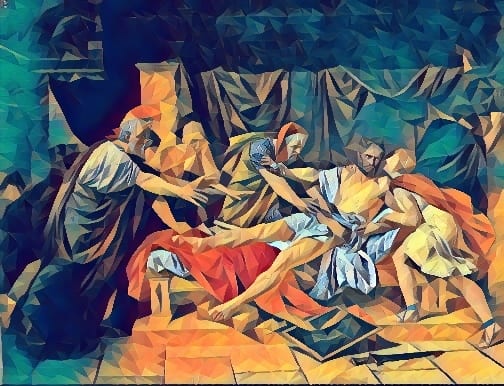The Stoics Who Went into Exile (or Were Killed)
The Stoics were a philosophical school that taught that people could maintain their composure and happiness in the face of difficulties. This philosophy was attractive in turbulent times, and many famous Stoics were exiled (or killed) for their beliefs. In this article, we will explore the lives of some of the most famous Stoics who were persecuted for their beliefs.
If you first want to get a more detailed overview of who the Stoics were and what they believed in, you can view this article.
Lucius Annaeus Seneca: sentenced to death
Lived from 4 B.C. to 65 A.D.
Lucius Annaeus Seneca (also called Seneca the Younger) was a Stoic philosopher and statesman who was forced by Emperor Nero to take his own life. How did this happen? Well, Nero had ordered the death of Seneca's nephew Lucan, and Seneca refused to participate. As a result, Nero turned on him and accused Seneca of plotting against him - although there was no evidence of this. As a result, Seneca was forced to take his own life.
This series of events is a prime example of how a Stoic could face death or banishment-and of how little could be done to prevent death if the emperor desired it. At least Seneca could take matters into his own hands.
A list of other philosophical schools and their philosophers you can find here.
Cato the Younger: banished and driven to suicide
Born 95 BC, died April 12, 46 BC.
Marcus Porcius Cato, was a Stoic philosopher who lived in the first century BC. Because of his beliefs, he was first banished by Julius Caesar and later committed suicide in order not to submit to Caesar's rule.
Knowing that the city of Utica was likely to fall into Caesar's hands, Cato evacuated all citizens who wanted to flee Utica. He also arranged for an embassy consisting of allies and family members, led by one of Caesar's relatives, to ask for pardon on their behalf. Cato himself, however, was preparing for his death.
Cato discussed with his friends that according to Stoicism a truly free man would never become a slave.
He then demanded his sword and stabbed himself in the stomach. Plutarch gave the details of his death as follows:
"Cato unsheathed his sword and stabbed himself under the breast. His thrust, however, was somewhat weak... [and] he did not immediately finish himself... His servants heard the noise and cried out, and his son immediately came up with his friends... [A] physician went to him and tried to replace his entrails, which remained uninjured, and to sew up the wound. When Cato regained consciousness and realized this, he pushed the physician away, tore his entrails with his hands, tore the wound still further, and so died." - Plutarch (1919). "The Life of Cato the Younger."
After Caesar learned of his death, he declared that he was angry because he had missed the opportunity to pardon him.
Cato was a Stoic philosopher who believed in maintaining one's composure and happiness in the face of difficulties. The events mentioned above put his beliefs to the test. And he surpassed them. He proved to Roman society what had long been said about him: Cato was a great and steadfast character who stood up for what he believed was right. No matter what the cost.
Gaius Musonius Rufus: banished several times
Born before 30 AD, died before 101/102 AD.
Gaius Musonius Rufus lived in Rome and achieved great fame as a teacher of Stoic wisdom during the reign of Emperor Nero. He accompanied the senator Rubellius Plautus, who was a relative of Nero and was banished by the emperor. Both Rubellius and Musonius went to the province of Asia in 60 AD.
Two years later, Nero ordered Rubellius' death and Musonius advised the senator (according to an account by Tacitus) not to resist and quietly await death.
Since Musonius' fame and his dealings with stoically minded senators made him suspect, Nero banished him to the barren island of Gyaros after the failed Pisonian conspiracy in 65/66.
It remains uncertain whether Musonius was actually involved in the conspiracy.
During the exile, many young men came to the island to listen to Musonius' lectures.
Only after the death of Nero, possibly under Galba, Musonius returned to Rome.
But that was not all for Musonius. Under Emperor Verpasian, Musonius went into exile again, although he was exempt from the expulsion of the Stoic and Cynic philosophers.
In 79 AD, Musonius returned to Rome after the new emperor Titus took office. It is believed that the two had a personal relationship. Unfortunately, nothing is known about his subsequent life or death. Quite a lot of exile for one man, don't you think?
Epictetus: came from slavery
Epictetus was a stoic philosopher who was born into slavery, but eventually gained his freedom and became a popular teacher. However, he not only knew very well the life as an unfree man, but later he was also banished.
How did it happen that Epictetus was released from slavery? It is said that his master, who was himself a Stoic philosopher, admired Epictetus' wisdom and allowed him to study philosophy. After the death of his master, Epictetus was released into freedom.
Contrary to popular belief, it was not uncommon for slaves to be freed. Some Roman owners set them free at will, while others gave their slaves the opportunity to buy their own freedom - which was not unrealistic, since Roman slaves were paid a wage.
This does not mean that Epictetus had an easy life as a freedman. He lived in Rome, where the Stoics were often persecuted. Around 93 AD, that's exactly what the Roman emperor Domitian did. He banished all philosophers from the city, and Epictetus decided to move to Nicopolis in Epirus, Greece. There he founded a school of philosophy.
Flavius Arrianus: went into exile voluntarily
Born around 85-90 AD, died after 145/146
Flavius Arrianus was a Stoic philosopher and historian who wrote a popular book on Stoicism.
Arrian studied in Nicopolis under the famous Stoic philosopher Epictetus, whose school was also attended by prominent members of the noble families and where he may have met the future emperor Hadrian. In his youth he wrote two books on the philosophy of his teacher.
After his patron Hadrian died in 138 AD, Arrian moved to Athens and received Athenian citizenship. From 145 to 146 he held the office of the archon eponymos, a - at that time - purely honorary office without political influence. At this time Arrian began to devote himself to historiography.
There is no information about his death or his return to Rome, but it is rather unlikely that he died an unnatural death or that he returned to Rome.
So Flavius Arrianus was not forced into exile, but he somehow decided to leave Rome forever and make Athens his new home.
Zeno of Citium: reached Athens penniless
Born probably 333/332 B.C.; died 262/261 B.C.
Zeno from Citium was the founder of Stoicism. He was not sentenced to death and there is no evidence that he was exiled. Although this has been cited as an explanation for why he ended up in the city of Athens with nothing, even though he came from a very wealthy merchant family.
It is generally believed that he lost his wealth through a shipwreck (or a serious business defeat).
But there is no concrete evidence for this either, which leaves only speculation. In any case, it is clear that he came with nothing and rose to the top of Athens' intellectual leadership.
Marcus Tullius Cicero: dispossessed, forced to flee, murdered
Born January 3, 106 B.C., died December 7, 43 B.C.
Marcus Tullius Cicero was a Stoic philosopher who was not only forced to leave all his possessions behind and stripped of all his titles, but was eventually murdered.
Cicero was a Roman statesman, lawyer and philosopher who lived in the first century BC. He is considered one of the greatest orators and writers of Rome. Cicero was also an important figure in the development of natural law and wrote extensively on the subject.
In 43 BC Julius Caesar was assassinated and a civil war broke out. Cicero sided with the anti-Caesarian party. When Marcus Antonius (Mark Antony) and Octavian formed the Second Triumvirate in 43 BC, Cicero became a marked man. In 42 BC he was outlawed, that is, his property was confiscated, his name was removed from the Senate lists, and he was sentenced to death. Cicero was forced into exile and went into hiding, but was eventually betrayed and killed by someone close to him.
Cicero's tragic end does not make him unique among the Stoics. In fact, many Stoics died an early and often violent death.
These are just some of the Stoics who were exiled or killed for their beliefs. Although they suffered greatly, their Stoic philosophy helped them to keep their composure and be happy despite all the difficulties. Their example is an inspiration to us all.
Do you know other Stoics who were exiled or killed for their beliefs? Let us know in the comments! Thanks for reading!







